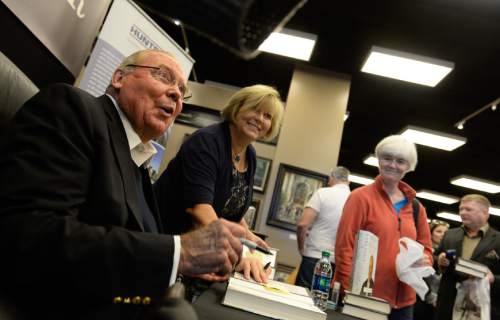This is an archived article that was published on sltrib.com in 2015, and information in the article may be outdated. It is provided only for personal research purposes and may not be reprinted.
Jon Huntsman Sr. worked at the U.S. Health, Education and Welfare Department all of six months before a friend on President Richard Nixon's personal staff recommended him for a higher-profile post that would place him a few feet from the Oval Office.
Fred Malek was able to give Huntsman a warning exactly 10 minutes before H.R. "Bob" Haldeman, Nixon's chief of staff, called. Haldeman demanded that Huntsman rush to the White House. When Huntsman got there, Haldeman had him cool his heels in the West Wing waiting room for 90 minutes. The interviews lasted two grueling days and included questions from Vice President Spiro Agnew. Finally, Haldeman ended his inquisition with: "Are you a full tithe payer for your church?"
The question stunned Huntsman. He'd never had anyone outside The Church of Jesus Christ of Latter-day Saints ask him that question. He said, yes, he did give the church 10 percent of his income.
"Good," Haldeman said, "we don't have to worry about your integrity then, do we?"
Huntsman became Nixon's staff secretary in February 1971, a job that paid $6,000 a year less than his HEW post, but came with some heady responsibilities, including managing staff salaries and the president's documents. He held the job for a year.
He later would say he left because his fledgling Styrofoam packing company needed him and so did his large family, which may have been true, but he also was exhausted and frustrated. The man was burned out, unwilling to deal with the intense pressures of the West Wing any longer. And the feeling was mutual. Haldeman had had his fill of Huntsman and wanted him gone.
Reflecting decades later on his year on Nixon's staff, Huntsman was full of warring emotions. He told interviewers it was "a great experience" and professed his love for Nixon. At the same time, he displayed his loathing for Haldeman.
He ended up leaving the White House four months before the June 1972 Watergate break-in, which eventually would take down Nixon and send Haldeman to prison. Huntsman escaped the scandal untouched.
Months later, he would realize how close he came to being a co-conspirator. In December 1971, Haldeman asked Huntsman to approach one of his first employers with an offer. The president would nominate Dudley Swim, a California recluse and a brilliant investor, to become the ambassador to Australia for $100,000 in cash. Swim, for whom Huntsman worked briefly, initially resisted, but eventually consented. The plan was for Huntsman to fly to California to pick up the money. Huntsman says he didn't understand why Swim couldn't just write a check, until Watergate press coverage disclosed that the Committee to Re-elect the President was collecting illegal contributions and using them for nefarious purposes.
Swim died of a heart attack the day before Huntsman was expected to make the trip.
"His passing saved me from becoming a bagman in an illegal contribution scheme," Huntsman said. "And, for that, I remain forever grateful."
Huntsman had a hard time reconciling the Nixon he knew with the one who resigned in disgrace.
"There was obviously a dark side to Nixon. History has proven that. I didn't see it. His behavior didn't suggest it. I was treated extremely well by the president. I loved him," he said. Later he added: "Nixon was my hero and my kids' hero."



